Results
-
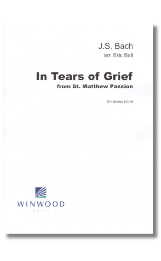 £37.95
£37.95InTears of Grief (Score and Parts) - J.S. Bach arr. Eric Ball
Well-known chorale from St Matthew Passion arranged by a master. Duration: 6:30
Estimated dispatch 7-9 working days
-
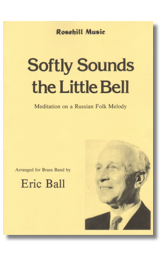 £37.95
£37.95Softly Sounds The Little Bell (Score and Parts) - Eric Ball
Russian folk melody arranged by the celebrated arranger of his day.
Estimated dispatch 7-9 working days
-
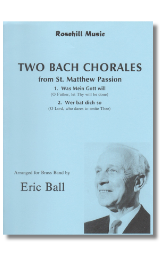 £37.95
£37.95Two Bach Chorales (Score and Parts) - J.S. Bach arr. Eric Ball
Two chorales from St Matthew Passion arranged by the celebrated arranger of his day: Was Mein Gott will and Wer bat dich so. Duration: 6:00
Estimated dispatch 7-9 working days
-
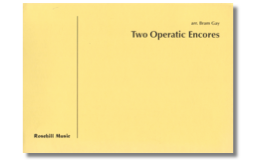 £37.95
£37.95Two Operatic Encores (Score and Parts) - Bram Gay
Two encores in one publication! Donizetti's 'Una Furtiva Lacrima' ('A Secret Tear') is arranged as a trombone or euphonium solo while Puccini's 'Signore ascolto' - Liu's Aria from his final opera Turandot - provides cornet soloists with a delicate showpiece.
Estimated dispatch 7-9 working days
-
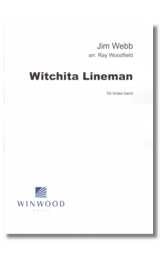 £37.95
£37.95Witchita LIneman (Score and Parts) - Jim Webb arr. Ray Woodfield
A Jim Webb classic expertly arranged for brass band.
Estimated dispatch 7-9 working days
-
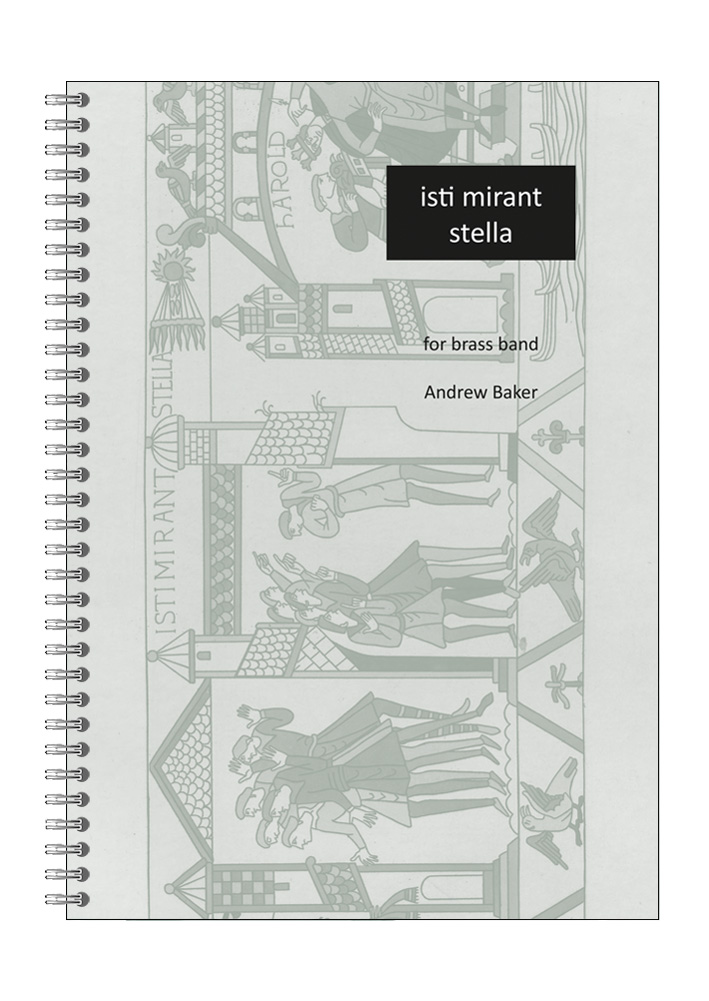 £45.00
£45.00isti mirant stella
Descriptionisti mirant stellais based on an extract from the text of the Bayeux Tapestry, which was commissioned by Odo, Bishop of Bayeux, to commemorate the Norman conquest of England in the 11th century. This text relates to the appearance of Halley's Comet in the spring of 1066. King Edward the Confessor died without an heir early on 5 January 1066 and despite his apparent promise of the throne to William, Duke of Normandy, the Anglo-Saxon Witenagemot appointed Harold Godwinson of Wessex as his successor. Just after Harold's hastily arranged coronation the comet appeared, reaching its perihelion on 20 March 1066. In the Middle Ages comets were regarded as evil omens; the tapestry depicts men gazing at the "star" in wonder and Harold himself apparently lost in nightmarish visions of invasion, with ghostly ships in the margins of the tapestry.The music attempts to reflect the mood of this brief but crucial period of English history - the unsettled matter of the royal succession linked in the superstitious medieval imagination to the haunting, spectral apparition of the comet. Medieval composition techniques are employed in places, including the use of a 'tenor', hocketing and a brief isoryhthmic motet. The music attempts to avoid tonal centres and particularly any form of diatonic 'resolution', instead exploring the issue of unresolved dissonance as a musical device in its own right.Performance Notes:All cornets, flugel and solo horn will require bottles filled with water to varying levels to 'tune' them to the correct pitch for the closing section of the piece. Pitches for the bottles are notated in the same transposition as the player's main instrument, so for example a notated D in the bottle part for flugel would sound as a C.All cornets except soprano require harmon mutes; where these are marked 'TR' these should have the tube removed. 'TI' denotes the tube should be left all the way in. Soprano and solo cornet III require metal straight mutes; flugel, all tenor horns, 2nd baritone and both euphoniums require fibre straight mutes. Soprano, all solo cornets and all trombones require cup mutes.The percussion section will require vibraphone (with a suitable bow, preferably a 'cello bow), glockenspiel, tubular bells (low and high E only), concert bass drum, tam-tam and snare drum - the bass drum and tam-tam will require brushes in addition to the normal beaters. In addition 1st horn and 1st baritone are required to play triangles, which should ideally be different pitches if possible.Approximate duration 7'48"NOTE: This set comes with a B4 score. To view a PDF preview click here.
Estimated dispatch 7-14 working days
-
Life Is For Loving - Roberto Danova - Steve Yorke
Arranged as a cornet solo, the man behind 'Angel In Blue' returns with this beautiful tear Jerker.
-
Son Of A Preacher Man - John Hurley & Ronnie Wilkins - Steve Yorke
Made famous by Dusty Springfield and arranged to feature Repiano, Flugel, Solo & 1st Horn.
-
 £34.70
£34.70Adoration (Cornet Solo with Brass Band) Florence Price trs. Andrew Wainwright
Florence Price was an American classical composer, pianist, organist and music teacher. She is noted as the first African-American woman to be recognised as a symphonic composer, and the first to have a composition played by a major orchestra. Price composed over 300 works: four symphonies, four concertos, as well as choral works, art songs, chamber music and music for solo instruments. In 2009, a substantial collection of her works and papers that had been previously considered lost was found in her abandoned summer home. Amongst these was this delightful work, Adoration, which had been composed in the 1950s for organ. According to IMSLP.org, the piece "failed to meet notice or renewal requirements to secure statutory copyright with no 'restoration' under the GATT amendments" and therefore is in the public domain. A version for violin and piano by Elaine Fine has become popular. This setting for cornet soloist with brass band has been arranged by Andrew Wainwright. It is also available as a Bb solo with piano here. To view a video of Andrew Roe performing the work, please visit: www.youtube.com/watch?v=_7UYlz8Fzxo Difficulty Level: 4th Section + Length: 3.15 minutes Sheet music available from: UK - www.brassband.co.uk USA - www.cimarronmusic.com Instrumentation: Cornet Soloist Bb Soprano Cornet Eb Solo Cornet Bb Repiano Cornet Bb 2nd Cornet Bb 3rd Cornet Bb Flugel Horn Bb Solo Horn Eb 1st Horn Eb 2nd Horn Eb 1st Baritone Bb 2nd Baritone Bb 1st Trombone Bb 2nd Trombone Bb Bass Trombone Euphonium Bb Bass Eb Bass Bb (Percussion Tacet)
In Stock: Estimated dispatch 1-3 working days
-
 £30.85
£30.85March from 'The Love for Three Oranges (Brass Band) Prokofiev arr. Wilkinson
This thrilling brass band arrangement of the March from 'The Love for Three Oranges' by Prokofiev has been skillfully arranged by Keith M. Wilkinson. This setting captures the essence of the original orchestral work, while showcasing the power and brilliance of the brass band. In 1918, Sergei Prokofiev undertook his first visit to the United States. A number of concerts of his works were held in Chicago, which were received very favourably. As a result, the director of the Chicago Opera Association, Cleofonte Campanini, commissioned Prokofiev to write an opera. It just so happened that, during his trip, he had written a draft of a libretto, based on the Italian play by Gozzi, L'amore delle tre melarance, adding some additional surrealism to the text. Given Prokofiev's poor English, and Americans unlikely to accept an opera in Russian, French was his final choice. The result, L'amour des trois oranges (or The Love for Three Oranges), which premiered at the Auditorium Theatre in Chicago on 30 December 1921, conducted by Prokofiev himself. The March from this opera is probably the most familiar part and has been used by CBS in the radio-drama series The FBI in Peace and War. It was also used in films such as The Brink's Job and Prokofiev quoted it in the second act of his ballet Cinderella. To view a rolling score video of the work please visit www.youtube.com/watch?v=I136sf8hxlU Duration: Approx. 2.10 minutes Difficulty Level: 3rd Section + PDF download includes parts and score. Sheet music available from www.brassband.co.uk Instrumentation: Soprano Cornet Eb Solo Cornet Bb Repiano Cornet Bb 2nd Cornet Bb 3rd Cornet Bb Flugel Horn Bb Solo Horn Eb 1st Horn Eb 2nd Horn Eb 1st Baritone Bb 2nd Baritone Bb 1st Trombone Bb 2nd Trombone Bb Bass Trombone Euphonium Bb Bass Eb Bass BbTimpani Percussion 1-2
In Stock: Estimated dispatch 1-3 working days
